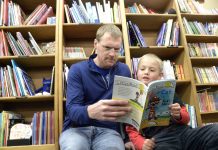Residents may vote on new tax during the June election
Morgan Hill – A portion of the Morgan Hill community heard Superintendent Alan Nishino on Friday roll out his plan for a parcel tax to benefit education, the first public announcement of possible tax plans after several hints by Nishino during recent school board meetings.
“We’re looking at possibly $10 per month, you drop more than that at Starbucks,” Nishino told the gathering of Home & School Club presidents and school principals. “There’s a direct correlation between good schools and education and property values.”
The tax could bring approximately $1 million per year to the district, according to Deputy Superintendent Bonnie Tognazzini, at $120 to $150 annually per parcel. There could be exemptions to the tax such as seniors 65 and over.
The tax could be on the June ballot, she said. Polling of the community will begin Feb. 11. If the board approves the parcel tax, their signed resolution must be sent to the Registrar of Voters before March 10. There are no other signatures required and no filing fees, but the measure would require a two-thirds majority by voters to pass.
“Part of our goal is to have some resources for the next school year, if the community is willing to endorse this,” said Tognazzini. “The funds would be used for our educational programs, and time is of the essence. If approved, the tax could be added to tax bills in August. We typically receive an installment in November or December. This way, we would know how much we could plan for.”
Reaction to the news the district is considering a parcel tax seemed positive from those attending the Friday meeting.
“This is such an excellent idea,” Live Oak High parent Elaine Reimer said while filling in for the Live Oak Homeschool president on Friday. “It’s just the best thing that could happen to this district and this community.”
This month, Santa Clara County supervisors will consider whether to place a quarter-cent or half-cent sales tax on the June ballot. That tax measure may include funding for the Santa Clara Valley Transportation Authority. If it doesn’t, the VTA may place its own tax measure on the ballot.
MHUSD officials and School Board trustees have identified several areas that are currently underfunded and would benefit from the tax.
“The major emphasis would be technology; there are some real critical pieces we need to put in place,” Tognazzini said. “We have some catching up to do. Our infrastructure needs help. We need updated computers for kids in classrooms, software packages. We need to upgrade our technology to provide curricular access to kids, and for parents to have access to student progress.”
Other areas needing a financial boost include the district’s agricultural program, athletics and fine arts, including music.
“I can speak firsthand about music,” Trustee Don Moody said. “It takes a lot of bingo to finance a marching band. It’s like a downward spiral: the fewer participants in band, the fewer parents we have to work bingo to make money for the band. When there is plenty of money and the program flourishes, it entices more students … It would just be nice not to struggle all the time about funding the elementary music program. We were able to find funding for this year, but we’ll have to look at something for next year. It’s an annual battle. It shouldn’t be that way.”
Moody noted that other fine arts programs and athletics were in similar financial shape, mostly relying on money from boosters and fundraising to keep functioning.
Trustee Peter Mandel said the board has talked about finding ways to bring in additional revenue to the district in order to fund these types of programs.
“It’s pretty well accepted that there isn’t sufficient funding to do a great job, throughout the state,” he said. “We go through this battle, as do other districts. If we want to be one of the top districts, provide one of the top educations in the county, we have some issues that need to be addressed. If we did that, if we funded these underfunded programs, it will benefit the kids, benefit the community. I think the community recognizes that. The result would be bettered educated kids and higher property values. There’s recognition of those facts. Now, how do we get there? Our district has never had a parcel tax before.”
The district plans to have the tax expire, but hasn’t determined how many years it would last, Tognazzini said. She said the district is soliciting public input before putting the measure on the June ballot.
“What’s normally done is there are consultants who are very good at this, and they will be handling the polling of the community,” Mandel said. “The consultant frames the questions to reflect what’s relevant to your community. They might ask what are the alternatives of how the money could be directed, should their be exemptions. The questions would be unique to our community.”







